
The Arizona–Arizona State football rivalry is a college football rivalry between the University of Arizona Wildcats (UA) and the Arizona State University Sun Devils (ASU).

The Miami Hurricanes football team represents the University of Miami in college football. The Hurricanes compete in the NCAA's Division I Football Bowl Subdivision, the highest level of collegiate football in the nation. The team is a member of the Atlantic Coast Conference, one of the five Power Five conferences in college football. The program began in 1926. Since then, it has since won five AP national championships in 1983, 1987, 1989, 1991, and 2001.

The Florida–Miami football rivalry is an American college football rivalry between the Florida Gators football team of the University of Florida and Miami Hurricanes football team of the University of Miami. The game was played annually from 1944 until 1987, and is now played intermittently. The winning team was formerly awarded the Seminole War Canoe Trophy. Today, the round robin winner of the three biggest schools in the state of Florida receives the Florida Cup for beating the other two schools in the same season. The two teams will next play in the 2024 and 2025 seasons. Miami leads the series 29–27.
The 1992 NCAA Division I-A football season was the first year of the Bowl Coalition and concluded with Alabama's first national championship in thirteen years—their first since the departure of Bear Bryant. One of Bryant's former players, Gene Stallings, was the head coach, and he used a style similar to Bryant's, a smashmouth running game combined with a tough defense.

The 2001 NCAA Division I-A football season was the first college football season of the 21st century. It ended with the University of Miami winning the national title for the fifth time.
The 1983 NCAA Division I-A football season ended with the University of Miami, led by Bernie Kosar, winning their first national championship over perennial power and top ranked Nebraska in the Orange Bowl.

The Miami–Cincinnati Victory Bell is the trophy awarded to the winner of the American college football rivalry game played by the Cincinnati Bearcats football team of the University of Cincinnati and the Miami RedHawks football team of Miami University. The Victory Bell is the oldest current non-conference college football rivalry in the United States, the oldest rivalry in the NCAA Division I Football Bowl Subdivision, having first played in 1888, and being only tied with the UNC-Wake Forest rivalry, and the Carolina-Duke football game, both of which were first played in 1888, And is also the fourth-most played college football rivalry game, with 127 meetings total.

The Florida Gators football program represents the University of Florida (UF) in American college football. Florida competes in the Football Bowl Subdivision (FBS) of the National Collegiate Athletic Association (NCAA) and the Eastern Division of the Southeastern Conference (SEC) They play their home games on Steve Spurrier-Florida Field at Ben Hill Griffin Stadium on the university's Gainesville campus.
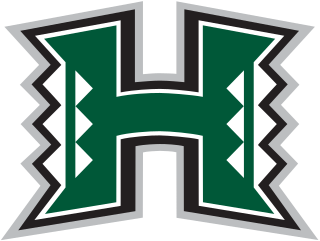
The Hawaii Rainbow Warriors football team represents the University of Hawaiʻi at Mānoa in NCAA Division I FBS college football. It was part of the Western Athletic Conference until July 2012, when the team joined the Mountain West Conference.
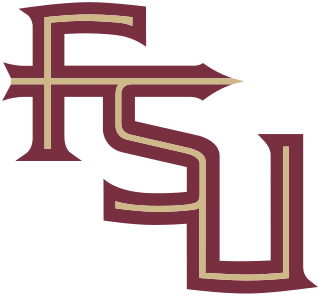
The Florida State Seminoles football team represents Florida State University in the sport of American football. The Seminoles compete in the NCAA Division I Football Bowl Subdivision (FBS) of the National Collegiate Athletic Association (NCAA) and the Atlantic Coast Conference (ACC). The team is currently coached by Mike Norvell, and plays home games at Doak Campbell Stadium, the 15th largest stadium in college football, located on-campus in Tallahassee, Florida. The Seminoles previously competed as part of the ACC Atlantic Division.

The Alabama Crimson Tide football program represents the University of Alabama in the sport of American football. The team competes in the Football Bowl Subdivision (FBS) of the National Collegiate Athletic Association (NCAA) and the Western Division of the Southeastern Conference (SEC). The team is currently led by Kalen DeBoer. The Crimson Tide is among the most storied and decorated football programs in NCAA history. Since beginning play in 1892, the program claims 18 national championships, including 13 wire-service national titles in the poll-era, and five other titles before the poll-era. From 1958 to 1982, the team was led by Hall of Fame coach Paul "Bear" Bryant, who won six national titles with the program. Alabama then had a dominant run under head coach Nick Saban between 2007 and 2023, resulting in six further national titles.

The UCF Knights are the athletic teams that represent the University of Central Florida in unincorporated Orange County, Florida near Orlando. The Knights participate in the National Collegiate Athletic Association's (NCAA) Division I as a member of the Big 12 Conference. Since men's soccer is not sponsored by the Big 12, they play in the Sun Belt Conference.
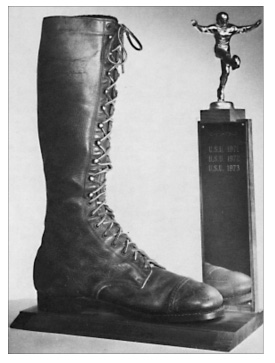
The Beehive Boot, which signifies instate football supremacy among Division I FBS universities from the state of Utah, began in the 1971 NCAA University Division football season. The authentic pioneer boot, which is estimated to be well over 100 years old, is typically awarded annually to the Utah school with the best record against its instate NCAA Division I FBS foes. The schools that compete for the boot are Brigham Young, Utah, and Utah State. Weber State was originally eligible to win the trophy and games against them counted towards their opponents' record when determining the winner of the trophy. It is unclear when this stopped being the case, but it was at least by 2012, when Utah State won the trophy over BYU.
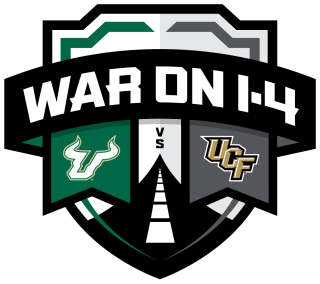
The War on I-4 is a college rivalry between the University of Central Florida Knights and University of South Florida Bulls. The rivalry is best known for its college football matchup which originated in a series of football games played from 2005 to 2008 and now takes place on Thanksgiving weekend, the de facto "rivalry weekend" for FBS football. In 2013, when UCF joined the American Athletic Conference, the schools began competing annually in all sports. In 2016, the schools officially adopted the "War on I-4" as an official competition series. Each year, the team with the most wins across all sports receives a gold trophy styled after an Interstate 4 (I-4) road sign with the logos of each school. The winner of the annual football game also receives a similar trophy.

The Virginia Tech Hokies football team represents Virginia Polytechnic Institute and State University in the sport of American football. The Hokies compete in the Football Bowl Subdivision (FBS) of the National Collegiate Athletic Association (NCAA) and the Coastal Division of the Atlantic Coast Conference. They previously competed in the Big East. Their home games are played at Lane Stadium, located in Blacksburg, Virginia, with a seating capacity of over 65,000 fans. Lane Stadium is considered to be one of the loudest stadiums in the country, being voted number two in ESPN's 2007 "Top 20 Scariest Places to Play". It was also recognized in 2005 by Rivals.com as having the best home-field advantage in the country.

The Houston–Rice rivalry is a crosstown college rivalry between the Houston Cougars of the University of Houston and Rice Owls of Rice University. The universities are located approximately five miles from one another. It is one of the few NCAA Division I crosstown rivalries, especially between institutions that field Division I Football Bowl Subdivision teams.

The Florida State–Miami football rivalry is an American college football rivalry between the Florida State Seminoles football team of Florida State University and Miami Hurricanes football team of the University of Miami. Since the late 1980s, one or both squads have been highly ranked entering the game, adding national championship implications to an already heated rivalry. Kicks have played an important role in the series with many wide right, wide left, blocks and other mistakes occurring with the game in the balance. Miami leads the series 35–33 through the 2023 season.
The Choke at Doak was a 1994 college football game between the Florida Gators and Florida State Seminoles. The game is one of the most memorable in the heated Florida–Florida State football rivalry and tied the NCAA record for the biggest fourth-quarter comeback. In the matchup of 9–1 cross-state rivals at Florida State's Doak Campbell Stadium, Florida squandered a 28-point fourth quarter lead and allowed the Seminoles to tie the score at 31 in the final minutes. Because the game occurred before the advent of overtime in college football, it ended in a tie that would be regarded very differently by each team's fan base. The post season Sugar Bowl featured a rematch of the Seminoles vs Gators. Before the game commenced, the score board indicated 5th quarter.
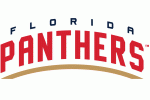
The Lightning–Panthers rivalry, also known as the Battle of Florida, is an American professional ice hockey rivalry between the Tampa Bay Lightning and the Florida Panthers. Both the Lightning and the Panthers compete in the National Hockey League (NHL)'s Atlantic Division. In past seasons, the rivalry has been recognized in a trophy known as the Governor's Cup, also called the Sunshine Cup and later the Nextel Cup Challenge.
















